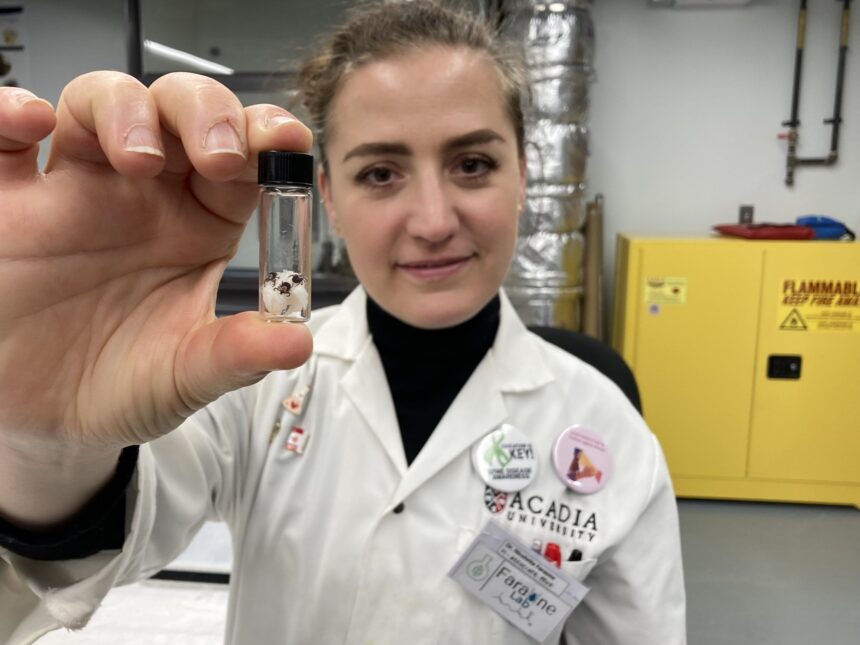Published Apr 11, 2025 • Last updated 7 hours ago • 3 minute readAcadia University researcher Nicoletta Faraone with ticks in her lab. New work by her research team has shown promising results in the use of lemongrass essential oil to protect people from Lyme disease-carrying blacklegged ticks.Researchers at Acadia University have made strides in looking at ways to keep Lyme disease-carrying blacklegged ticks from affecting people with some encouraging results from lemongrass essential oil.Nicoletta Faraone, from the university’s chemistry department, says the finding of her team, published in Current Research in Insect Science, could lead to more effective natural tick repellents that are a safer alternative to synthetic chemicals such as DEET.THIS CONTENT IS RESERVED FOR SUBSCRIBERS ONLY.Subscribe now to access this story and more:Unlimited access to the website and appExclusive access to premium content, newsletters and podcastsFull access to the e-Edition app, an electronic replica of the print edition that you can share, download and comment onEnjoy insights and behind-the-scenes analysis from our award-winning journalistsSupport local journalists and the next generation of journalistsSUBSCRIBE TO UNLOCK MORE ARTICLES.Subscribe or sign in to your account to continue your reading experience.Unlimited access to the website and appExclusive access to premium content, newsletters and podcastsFull access to the e-Edition app, an electronic replica of the print edition that you can share, download and comment onEnjoy insights and behind-the-scenes analysis from our award-winning journalistsSupport local journalists and the next generation of journalistsRegister to unlock more articles.Create an account or sign in to continue your reading experience.Access additional stories every monthShare your thoughts and join the conversation in our commenting communityGet email updates from your favourite authorsSign In or Create an AccountorArticle contentBlacklegged ticks don’t have eyes and are almost exclusively dependent on their sense of smell to find a creature to latch onto.Lemongrass essential oil is already being used in a local product that her lab tested to determine its effectiveness, but she wanted to know why it worked.“It was trying to find out how the mechanism of repellency works because we don’t know much about the tick sensory system and how they smell and how they taste,” Faraone said. “What we know is that the ticks are almost totally blind, so they orient in their environment by olfaction and by taste.”She and her team wanted to determine whether the oil repelled the ticks or just masked the smell of people, and whether longer exposure to the oil would impact the tick’s ability to smell something.She said they found that the oil did seem to mask the smell.In an initial trial, they exposed a tick to fumes from the oil for 20 minutes and then checked to see if it could detect an attractant.Article content“The tick was confused,” she said. “The tick is showing it is repelled from a distance, but if it is exposed for a longer time to a repellent it loses the ability to detect.”She said the importance is that a tick may not crawl on someone if they are wearing a deterrent made of the oil. But even if it is not repelled, the tick could become disoriented and drop off a potential host because it cannot smell them.“The next question would be: It’s masking, but how long will that be good for?” Faraone said. “Is the tick going to be affected because it’s exposed to the repellent? Could it kill the tick, or will it be impaired permanently? These are all the questions we are going to try to answer in the next step (of the study).”She said 70 per cent of the ticks collected in Nova Scotia by her team had the bacteria that causes Lyme disease. They wanted to see if there was any difference in the response of ticks that had it compared to those that did not, and whether the presence of the disease made the ticks stronger or more resistant.Article content“We tested this and didn’t see any difference, but we don’t know how much of the pathogen they are (each) carrying,” Faraone said.But the early results don’t mean people should be trying to get lemongrass essential oil and smear themselves before going into the woods.“Everything is chemical, and everything that is not used in the right concentration can be dangerous,” Faraone said. “Essential oils can induce skin irritation and be toxic to pets, and be harmful if they are not used properly.”But as a natural product, it is environmentally friendly, while the synthetic DEET has been linked to environmental and health concerns, including toxicity to aquatic life and skin irritation.But planting a hedge of lemongrass along property lines is not really a solution, Faraone said, because ticks could still come in on animals and birds.Article content
Acadia tick researchers see promise in lemongrass essential oil as a repellent











